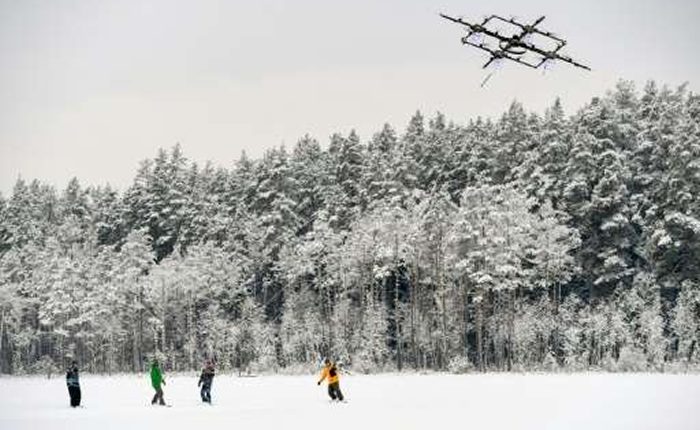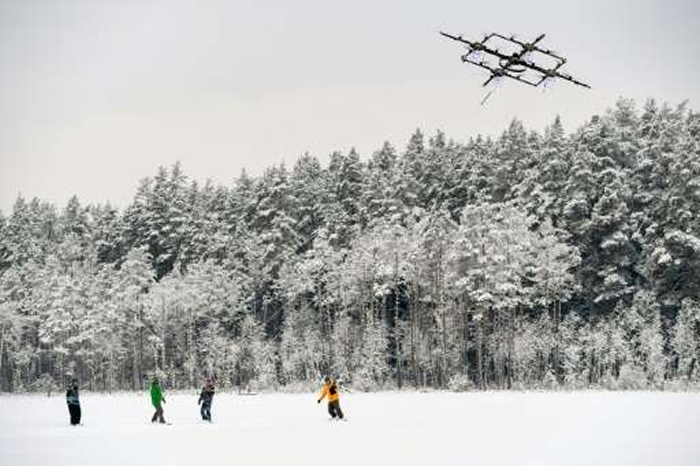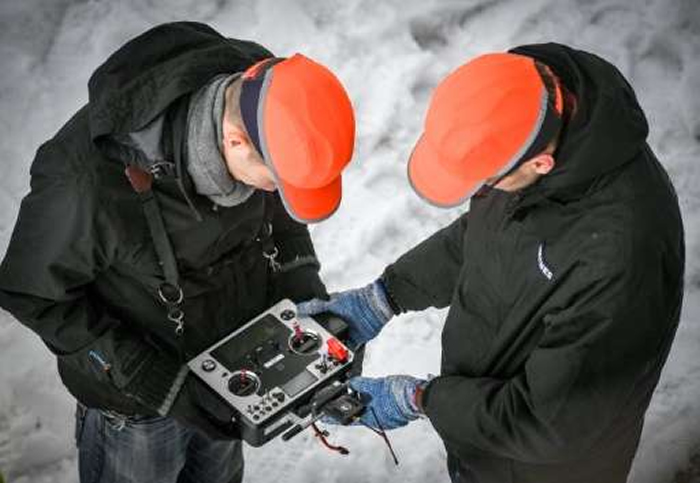Latvia’s remote Lake Ninieris, skirted on all sides by snow-clad pine forests, would be the perfect picture of winter tranquility—were it not for the huge drone buzzing like a swarm of angry bees as it zooms above the solid ice surface.
The powerful three-meter-long (nine-foot) drone, sporting 16 spinning propellers, is fitted with long tow ropes with handles, the kind used in water-skiing.
Two snowboarders gripping them glide across the ice, pulled along by the drone before performing a series of high-speed turns and slides.
As snow sprays up from beneath their snowboards, a small audience of cross-country skiers and ice fishermen look on in amazement at what might be the next extreme sports craze: droneboarding.
The drone prototype is the work of Latvian specialists Aerones and they are putting their invention through its paces, with up to four snowboarders being dragged across the ice at a time.
“It seems to be a successful test,” says Janis Putrams, 35, wearing a broad grin, not least because as Aerones CEO he is in charge of the enormous remote control unit used to steer the drone’s flight.
“We started thinking about it two years ago. It was a sort of Friday afternoon idea and we just wondered if it would be possible,” Putrams told AFP.
They first built a small four-propeller drone before using it to test out droneboarding about a year ago. “But the idea was always to build something big, to see how much power it could have. Luckily in Latvia we have both great engineers and great winters, so it’s ideal for droneboarding,” says the soft-spoken engineer.
In theory the top speed is around 150km/h (94mph), but piloting becomes difficult at that velocity, so today droneboarders have to make do with speeds of around 60kph.
Saving lives?
Even though flight times are still restricted to around 10 minutes using on-board batteries, a drone weighing 55kg (121lbs) is able to lift up to 145kg.
While the winter sports potential of the drones is considerable, the real motivation for developing them is rooted in that lifting power, says Putrams.
Having cost €35,000 ($37,000) to build, Aerones is now looking to partner with companies and organisations working in firefighting as well as search and rescue to take the project to its next stage.
“It’s not just for droneboarding. We could use it to lift someone from the roof of a burning building, or a hose could be sprayed on parts of a fire that would be inaccessible to ladders,” says Putrams.
“If there was a connected power supply instead of batteries, the flight times would be limitless,” he says.
While he’s optimistic about the future of his business, Putrams acknowledges that “there will need to be a lot of certification before we see large numbers of these drones operating commercially, to make sure only safe drones are used.”
But as far as the intrepid snowboarders are concerned, there’s plenty of snow sports potential for drones too.
“That was awesome,” Davis Ceze, a 24-year-old wakeboarder and snowboarder told AFP.
“It’s actually easier than snowboarding on the mountain because it’s flat. You don’t need to read the hill and you can get constant speeds.”
Anita Leina, a 22-year-old fashion designer and wakeboarder, would like to take the experience to the next level.
“It’s very cool. But the ultimate would be to control your own drone while you were snowboarding.”
More information: Phys.org




Comments are closed, but trackbacks and pingbacks are open.